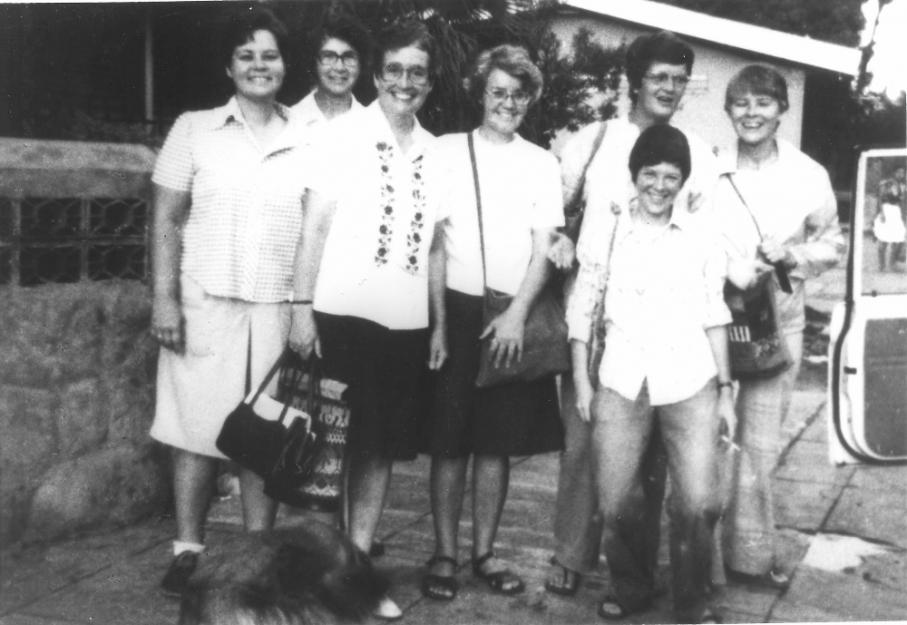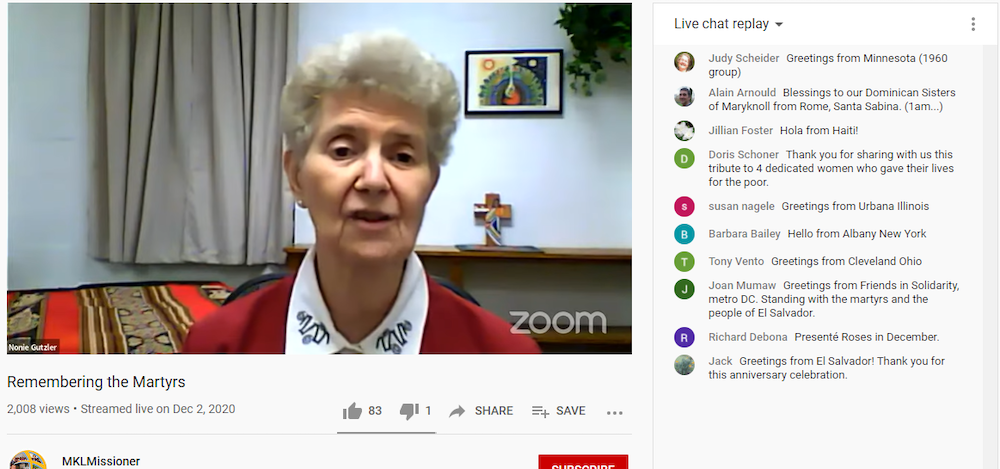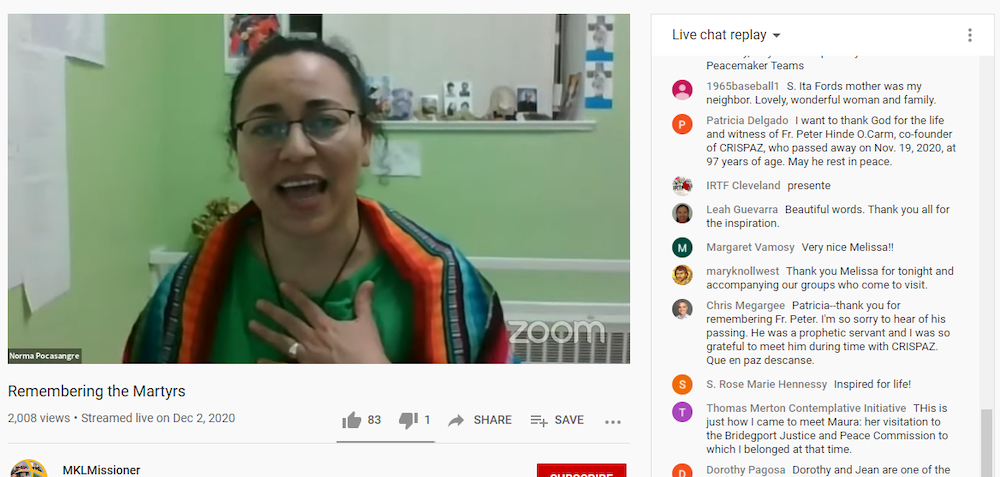
August 1980 in La Libertad, El Salvador, left to right: and Sr. Christine Rody, a Vincentian Sister of Charity of Cincinnati, who is presently the Defender of the Bond in the Cleveland Diocese and who served on the Cleveland Latin American Mission Team with Dorothy Kazel, an unidentified Cleveland missioner, Sr. Maura Clarke, Sr. Theresa Alexander, Sr. Pat Edmiston, Sr. Ita Ford (front) and Sr. Dorothy Kazel. (Maryknoll Mission Archives)
Hundreds of sisters, male religious, and lay social justice and human rights activists gathered Dec. 2, mostly online, to commemorate the 40th anniversary of the martyrdom of four American churchwomen, vowing to continue their work for a better world.
In honoring the memory of Ursuline Sr. Dorothy Kazel, Maryknoll Srs. Maura Clarke and Ita Ford, and lay missioner Jean Donovan, the world makes "a renewed commitment to the struggle for justice," said Sr. Nonie Gutzler, the president of the Maryknoll Sisters, at the conclusion of an evening online memorial by the Maryknoll Sisters.
The four women "belong not just to us, but to the whole world," Gutzler said at the 90-minute event, which featured prayer, meditation and meditative dance, singing, and video remembrances from the women's colleagues and families.
An opening prayer noted that Dec. 2, 1980, the day the women were killed, "was stark, indescribable and agonizing in its intensity": The four women, who had been working alongside the poor and displaced during the Salvadoran civil war, were abducted, raped and then shot to death by five Salvadoran National Guardsmen.
"Jean, Dorothy, Maura and Ita are sacraments leading us to welcome the challenges and multiple problems to be solved now for the common good," said Sr. Melinda Roper, who was president of the Maryknoll Sisters in 1980 and is now based in Panama.
The killings, which occurred during the transition between the administrations of presidents Jimmy Carter and Ronald Reagan, focused attention on U.S.-funded support for the Salvadoran military. It was a galvanizing moment in a decadelong war that resulted in at least 75,000 deaths and spurred activism and solidarity movements, many church-led, in the United States.
Sr. Claudette LaVerdiere, a former Maryknoll president and the author of a biography of the congregation's founder, Mother Mary Joseph Rogers, noted the centrality of mission in the women's lives and said Rogers' belief that martyrdom "is to love beyond measure" applied to the four women.
For Rogers and the early Maryknoll sisters, "mission constituted every aspect of their lives together, a total way of life," LaVerdiere said.
Maryknoll Sr. Norma Pocasangre, a Salvadoran who works as a Maryknoll missionary in China and who made her first vows in 2005, said she was inspired by the example of the churchwomen. She recalled attending a 20th anniversary commemoration at the spot in El Salvador where the four women were killed.
"My whole body, mind and spirit felt a sense of wonder," she said. "I felt something deep within me."
Pocasangre added that she would come to see the women "as the guides in my vocation of my vocational journey."
"They showed a radical commitment to love unconditionally," she told the Dec. 2 Maryknoll event.
Ursuline Sr. Sheila Marie Tobbe, who worked with Kazel and Donovan in El Salvador, told attendees that love served as an example to her, and her experience with the women "changed the way I view the church."
"Jean and Dorothy were strong Gospel women," she added.

Sr. Nonie Gutzler, the president of the Maryknoll Sisters, speaks at the Maryknoll Sisters' Dec. 2 online event memorializing four American churchwomen killed in 1980 in El Salvador. (GSR screenshot)
Advertisement
A central focus of the Dec. 2 event, titled "Called by the Energy of the Four Churchwomen: We Too Respond," was affirming the importance of carrying the women's work forward in new ways to address today's social injustices.
Ruth Ford, Ita Ford's niece, said the word she now most associates with her aunt is "resilience." She said she and other nieces and nephews, as well as great-nieces and -nephews, in some way carry on Ita Ford's work through their jobs and social commitments.
"That witness is something we still experience today," Ford said, adding that if her aunt were alive now, she would be working to end racism and police brutality and improve health care for all.
Deirdre Keogh, a niece of Maura Clarke, said much the same of her aunt, noting that Clarke's love of nature, her commitment to prayer and her involvement in the wider world remain guiding examples to her family.
Clarke's concern for neighbors and community were palpable, she said: "She listened to people. She cared about them, and she wanted to help them."
New York-based journalist Eileen Markey, the author of a 2016 biography of Clarke, never met her subject but said her own life was transformed in researching and writing the book, A Radical Faith: The Assassination of Sister Maura.
"She remains with me," Markey told attendees.
The lesson Markey said she learned from Clarke's life: "God is in the doing."

Marykoll Sr. Norma Pocasangre, a Salvadoran missionary, speaks at the Maryknoll Sisters' Dec. 2 online event memorializing four American churchwomen killed in 1980 in El Salvador. (GSR screenshot)
Clarke and the three other women, Markey said, "weren't afraid of confronting ugly realities" and made choices that were antithetical to a troubling aspect of American life: individual isolation.
She said she sees Clarke and the other women as "perfectly contemporary role models" for today's social movements, noting that their work in solidarity with people who live in poverty was done "side-by-side as sisters and not as experts."
"Their message was more than our ears could hear," Markey said. " 'Subversive hope' is what I try to cultivate in their memory."
Memory lives on in a strong way for Celine Woznica, a onetime Maryknoll lay missioner in Nicaragua, and Mary Heidkamp, president of The Grail USA, a lay women's group, who both knew Clarke when she was doing mission education work in the United States.
Both women named daughters after Clarke and remain involved in justice movements, they said.
Among those honoring the four women: Pope Francis
The Dec. 2 Maryknoll event was among many recognitions of the four women. Other congregations and groups also held online memorials and services. And even with the global coronavirus pandemic, numerous events were held in El Salvador.
Pope Francis also took note of the women's lives, saying at his weekly audience Dec. 2, "With evangelical commitment and taking great risks, they brought food and medicine to displaced people and helped the poorest families."
"These women lived their faith with great generosity. They are an example for all to become faithful missionary disciples," he said.
A group of pilgrims gathers near the tomb of Maryknoll Srs. Ita Ford and Maura Clarke on Dec. 1, the eve of the 40th anniversary of their assassination in the Central American nation. (CNS/Rhina Guidos)
Numerous written memories and recollections of the four women have been shared in recent days, dwelling on the need for those in justice movements to continue their work.
"Today, as we recall the story of Jean Donovan, may we remember her invitation to set aside our fears and walk with the people yearning to be free," wrote Eileen Purcell, the former executive director of the advocacy group SHARE El Salvador, who met Donovan in El Salvador in 1980.
"May we make our love concrete, through small and large gestures, through prayer and action, in community and song, in solidarity. May we draw strength and courage from her memory, from one another, from the beauty of the earth, full of hope and joy. "
Earlier recognition of the women includes a documentary on Donovan, "Roses in December." (It can be viewed on the website of the Romero Trust.)
Such recognition does not surprise those who knew the women.
Kazel and others shared a commitment to remain in El Salvador despite the dangers of the time, said Sr. Martha Owen, a member of the Ursuline Sisters of Cleveland, Ohio, who worked with Kazel in El Salvador from 1974 until Owen left El Salvador in 1979.
"The shepherd doesn't run out on his sheep" was a common refrain among Kazel and others, Owen told Global Sisters Report in an interview prior to the Dec. 2 events.
"It was her wish to stay on."
(GSR timeline/Pam Hackenmiller)
[Chris Herlinger is GSR New York and international correspondent. His email address is [email protected].]





